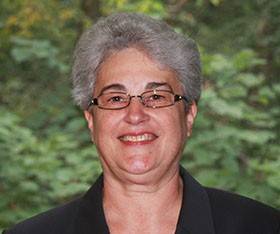Theresa Huston, Ph.D.

Theresa Huston
Senior Scientific Information Analyst
Chemical Abstracts Service
B.S. and Ph.D., Chemistry, Pennsylvania State University, State College
After earning her Ph.D. from Penn State University, Theresa Huston entered a challenging job market, and initially had a difficult time getting the attention of potential employers. Eventually, she was contacted by an employment agency after they saw her entry in the employment section of Chemical & Engineering News (C&EN). The position they offered her involved analyzing and abstracting chemistry-related journal articles and patent information with Chemical Abstracts Service (CAS), a division of the ACS.
Over the course of her 28 years at CAS, Huston has worked in a number of capacities and areas within the organization. For example, she worked for a number of years in support of the organization’s STN product; later, she decided that she preferred the analysis side of CAS’ business. Today, Huston works out of CAS’ Columbus, Ohio headquarters, where she abstracts and indexes patents and journal articles in the fields of thermochemistry, surface science, and catalysis.
If you want another position or to be on some committee, don’t be afraid to speak up and point out your strengths and background that would make you a good choice.
Typical day on the job:
I typically spend eight hours a day analyzing documents and inputting index entries on a computer. Some time is spent consulting with others and in meetings or training sessions.
Work environment:
I work in an individual office. I have a computer with two large monitors. I have reference chemistry and physics books and some indexing and computer manuals. The environment is usually quiet, which is important for concentration.
I work in an individual office. I have a computer with two large monitors. I have reference chemistry and physics books and some indexing and computer manuals. The environment is usually quiet, which is important for concentration.
Work schedule:
I typically work 40 hours a week. There are times when I need to put in extra time on weekends just to get the work done that is due that particular week. The environment is usually relaxed, unless we have a particularly heavy workload or several staff are absent.
Travel schedule:
I am not required to travel.
Tools you can’t live without:
Essentially all our software has been developed in-house. We have electronic delivery for all our documents and other software for inputting the data into our database. I could not live without the Registry and CA files to check on registry numbers and index headings.
What you like most about your job:
Although I have a given number of documents to analyze each week, I can usually choose in which order I want to process them. I also get to work in different scientific areas, which keeps it interesting. What I like the best are my fellow workers, who literally come from all over the world. I often find myself at lunch with staff from four or more different countries, and the conversations are never boring. We all try to help one another by consulting or doing work in areas that are backlogged at any particular time.
In general, it’s highly interesting work, in which I not only get an early view of some of the latest innovations in the world of chemistry, but also play a role in making it known to other chemists around the world.
Best productivity trick:
Take breaks when I need them — otherwise my productivity just drops.
Best career advice you’ve received:
If you want another position or to be on some committee, don’t be afraid to speak up and point out your strengths and background that would make you a good choice.
Skills or talents that make you a good fit for your job:
I have always liked languages. Knowing grammar and foreign languages is a must for my position. Living for two years in Germany certainly improved the German that I had learned in school. I never particularly liked working in labs, so this job is a great alternative for someone who loves chemistry. In my case, I use my knowledge of German to abstract and index patents and journal articles that originally appeared in German. Overall, my colleagues and I analyze documents in more than 50 languages, including more than 20 Asian languages.
Is there anything else you would like to mention about your career:
I worked as a front-line manager for eight years, but found that I did not like being away from the science and returned to analysis. I also worked on the STN Help Desk for our customers for several years, and really enjoyed that. I was given the opportunity to create a workshop on searching catalysts and to present it to some of our biggest customers in Germany.
Essential habit you wish you’d started earlier:
Exercise. It is a great way to work out stress and sometimes gives you time to mull over some problem that you have encountered during the day. I have learned that it is much better for me than working that extra hour when I am mentally tired and not very productive.
Favorite ACS resource:
Chemical & Engineering News. It highlights key research topics, businesses, and ACS news. Even if I can’t read entire articles, I can still follow the trends.
How you've benefited from being an ACS member:
First of all, it helped me to find my first and only job. The local section meetings are a great way to get to know the chemists in my area whom I would never meet otherwise. Serving in many positions within the section, including secretary and chair, has given me leadership and coping skills that I have used throughout my career. I was also an ACS councilor and served on several national committees, allowing me to meet and work with some phenomenal people. It has definitely enriched my life.

